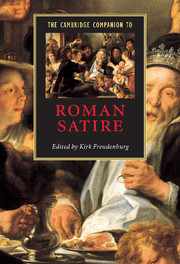Book contents
- Frontmatter
- Introduction
- Part I Satire as literature
- Part II Satire as social discourse
- Part III Beyond Rome
- 14 Roman satire in the sixteenth century
- 15 Alluding to satire
- 16 The Horatian and the Juvenalesque in English letters
- 17 The “presence” of Roman satire
- Conclusion
- Key dates for the study of Roman satire
- Bibliography
- Index
- Series list
17 - The “presence” of Roman satire
modern receptions and their interpretative implications
from Part III - Beyond Rome
Published online by Cambridge University Press: 28 May 2006
- Frontmatter
- Introduction
- Part I Satire as literature
- Part II Satire as social discourse
- Part III Beyond Rome
- 14 Roman satire in the sixteenth century
- 15 Alluding to satire
- 16 The Horatian and the Juvenalesque in English letters
- 17 The “presence” of Roman satire
- Conclusion
- Key dates for the study of Roman satire
- Bibliography
- Index
- Series list
Summary
It is a commonplace to say that satire is the most difficult genre to define, and always has been. “Metamorphic” and “Protean” are terms commonly applied to it, the latter perhaps suggesting that it not only has no stable form but will also continue to elude attempts to tie it down. The task of exploring what constitutes the “presence” of Roman satire in the present and recent past is thus a rather delicate one, for how can we recognize it to be “there” if we are not sure what we are looking for? If one looks hard enough, one can find James Joyce referring to Ulysses as “farraginous.” The satiric associations of this term (nostri farrago libelli, Juvenal 1.86) will certainly not have been lost on Joyce, but most readers could be forgiven for failing to spot the writer of Latin hexameter verse in this novel shape. Formal verse satire is still practiced, but not in a way that seems central to the oeuvre of any major author or to cultural practice more generally, as it could be argued it was in the seventeenth and eighteenth centuries. Although Martin Winkler in his anthology Juvenal in English detects some significant echoes in T. S. Eliot and W. H. Auden, twentieth-century engagement with Horace and Juvenal has largely come in the form of translations, but nothing has emerged that could begin to match the response of Dryden and Johnson to Juvenal. Instances of the invocation of Roman satirical texts as clear as Fellini’s Satyricon are very few and far between.
- Type
- Chapter
- Information
- The Cambridge Companion to Roman Satire , pp. 299 - 308Publisher: Cambridge University PressPrint publication year: 2005
- 2
- Cited by

